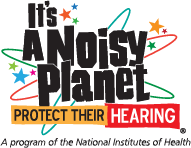The chatter of noisy school cafeterias and hallways, the boisterous marching bands, and the echo-filled gymnasiums will soon fade away. Give your children’s hearing a break during the summer and plan your family vacations in quieter places. Noisy Planet encourages you to explore a few vacation destinations with less noise pollution than amusement parks and outdoor concerts, such as:

- Camping in the woods. When you leave the sounds of the television and video games behind, you will be surprised at the variety of sounds you can experience around the campsite. Take a hike in the woods to listen for how different the birds sound from those at home. Bring along binoculars and an informational book to help your children identify birds.
- Visiting the seashore. Do you prefer water over woods? The beach can be soothing to many families with the soft, repeated sounds of waves against the shore and the call of seagulls overhead. You can build a sand castle, fly a kite, or read a book. Collect seashells and have your children hold one next to their ears so they can “hear the ocean.” Explain to your children that when they do that, they are actually hearing the vibration of the air between their ears and the seashell.
- Taking a trip to a lake. There, you might hear the sounds of fish jumping or frogs croaking. Many people who enjoy boating like to hear the sound of paddles splashing in the water or a sail flapping in the wind. Swimming, kayaking, or canoeing can prove refreshing and offer a chance for your family to be active together. Pack a healthy lunch to enjoy a full day’s outing.
Take time to explore the unique sounds of nature with your children this summer. Talk with your children about healthy hearing choices so they can enjoy the sounds of summer for a lifetime. Noisy Planet still wants you to enjoy all activities this summer, so be sure to bring your hearing protectors if you plan to go to a concert or sporting events, as they often reach 94-110 A-weighted decibels (dBA). Remember that you can damage your hearing when sounds are at or above 85 dBA.
Last Updated Date



